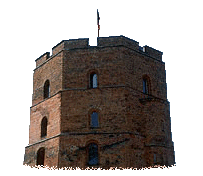|
Home » xyzzy » Tower » Little Known Civil War Fact
| Little Known Civil War Fact [message #54202] |
Sat, 12 February 2005 15:41  |
 elektratig
elektratig
Messages: 348
Registered: May 2009
|
Grand Master |
|
|
|
I've been reading voraciously about the US Civil War for the past six months or so. Yesterday, I stumbled across the following nugget: but for the fact that U.S. Grant's wife detested Lincoln's wife, Grant would have been sitting with Lincoln at the theater the night Lincoln was shot. After accepting Lee's surrender at Appomattox, Grant returned to Washington. Lincoln invited the Grants to accompany him and his wife to the theater. Mrs. Grant confessed to her husband that she detested Mrs. Lincoln, who had been rude and condescending to her on previous occasions, and refused to go. Grant begged off, and the couple left for their house in Burlington, NJ.
|
|
|
|
|
|
|
|
|
|
| Re: Little Known Civil War Fact [message #54208 is a reply to message #54207] |
Mon, 14 February 2005 07:57   |
 elektratig
elektratig
Messages: 348
Registered: May 2009
|
Grand Master |
|
|
|
Rest assured, I "root" for the Union whenever I read about the Civil War. Indeed, it's often painful for me to read about many of the Eastern campaigns, because the Federals were so often badly defeated. Consider: First Bull Run - Defeat
Shenandoah Valley Campaign -- Defeat
Peninsula Campaign -- Defeat
Second Bull Run -- Defeat
Antietam -- Tie
Fredericksburg -- Defeat
Mud March -- Defeat
Chancellorsville -- Defeat
Gettysburg -- Victory
Mine Run Campaign -- Defeat Luckily, the Union was blessed with the two greatest men of the era, Abraham Lincoln and Ulysses Grant. I am firmly convinced that both were essential to victory. Since my obsession is relatively new, I have never visited a Civil War battle site. That may change this coming summer, however. Little known Civil War fact No. 2: Ulysses Grant's original name was Hiram Ulysses Grant. His family called him "Ulys". When he went to West Point, he inverted his first and middle names because he did not want his luggage to bear the initials "HUG". When he arrived at West Point, the Army listed him as "Ulysses S. Grant", because that was the name under which his sponsor had submitted his application (presumably because his mother's maiden name was Simpson). The Army, being the Army, told him that it had admitted "Ulysses S. Grant" and that, if he was not "Ulysses S. Grant", he should go home.
|
|
|
|
|
|
|
|
| Re: Little Known Civil War Fact [message #54211 is a reply to message #54209] |
Mon, 14 February 2005 17:49   |
 elektratig
elektratig
Messages: 348
Registered: May 2009
|
Grand Master |
|
|
|
MB, I was not aware of the statistics you cite, but Scorsese's "The Gangs of New York", set in Five Points immediately before the Draft Riots, has a scene in which Irish immigrants are enlisted as they come down the gangplank. On the other side, Patrick Cleburne was an Irish Protestant, born and raised in County Cork, who came to the US in about 1850 and wound up in Helena, Arkansas. He had served for several years in the British Army. When the war came, he helped to organize and trained local volunteers, who were ultimately absorbed into the Army of Tennessee. He became probably the best Confederate general in the West, seeing heavy service at Shiloh, performing extremely well at Stones River, and saving the army at and after Chattanooga. In the winter of 1864, he proposed to Joseph Johnston and other senior commanders that the Confederacy incorporate Blacks into the army; needless to say, the proposal was turned down (the Confederacy ultimately began doing so in the closing months of the war). He was, in effect, murdered by John Bell Hood at the Battle of Franklin on November 30, 1864 when Hood destroyed his army in a fit of anger and revenge by sending it against entrenched Federal positions.
|
|
|
|
|
|
| Re: Little Known Civil War Fact [message #54213 is a reply to message #54212] |
Mon, 14 February 2005 21:16   |
 elektratig
elektratig
Messages: 348
Registered: May 2009
|
Grand Master |
|
|
|
MB, You're absolutely right -- logistics were crucial. The sizes of the armies -- 40,000 to 60,000 to 100,000 or more men -- were unprecedented. Just keeping them armed, clothed, supplied, fed and reasonably healthy was a tremendous task. It's amazing how many survived their wounds, including amputations. Among the generals, both Richard Ewell and John Bell Hood survived wounds that required amputation of a leg close to the hip, perhaps to the detriment of the Confederacy. Probably the most famous victim of sepsis/pneumonia was Stonewall Jackson. After being shot by "friendly fire" on the evening following his greatest victory, he had his arm amputated and seemed to be recovering, but then relapsed and died, apparently due to pneumonia. Surprisingly, the experts seem to believe that the blockade contributed little to the Union victory. It's an area I don't know a lot about and want to learn more. Washington was fortified, much as Richmond-Petersburg were. As I'm sure you know, much of the Eastern (Virginia) war was fought in northern Virginia, not all that far from Washington -- First and Second Manassas, Fredicksburg, Chancellorsville, the Wilderness. Even Sharpsburg (Antietam) and Gettysburg are not all that far away. There were only a few Confederate direct approaches to Washington, however, because (apart from political scare value) they served little purpose, although the threat of attack did tie up 20,000 - 50,000 troops covering the city. As late as July 1864, when the Army of the Potomac was beginning its siege of Richmond-Petersburg, Lee detatched a corps that marched to the gates of Washington but then turned back because it could not successfully attack the city (due to the defenses, reinforced by a Corps sent by Grant from the Richmond theater). George Meade assumed command of the Army of the Potomac from Joe Hooker days before Gettysburg (July 1-3, 1863). When Grant took command of the armies in March 1864, Meade offered to resign. Grant, impressed, declined the offer, and Meade remained in command of that Army through the end of the war. He performed extremely well at Gettysburg -- amazingly so in view of the fact that he had just assumed command and had been told little of what was going on by Hooker -- and for that we all owe him a debt of gratitude, but he was not an "offensive" general and his performance was mediocre at best thereafter. During the Overland Campaign (the May - June 1864 campaign that resulted in the siege of Richmond), Grant increasingly took over operational control of the Army of the Potomac. By late March 1865, when the Petersburg defenses collapsed, Phil Sheridan was unoffically in charge as Grant's most trusted confidant and spearheaded the drive to Appomatox. Meade was ill and followed along in an ambulance and was not present at the surrender.
|
|
|
|
Goto Forum:
Current Time: Sat Feb 07 23:05:39 CST 2026
|











